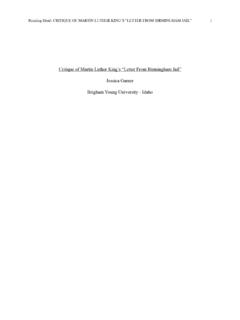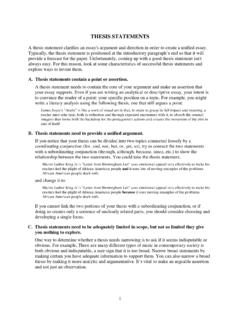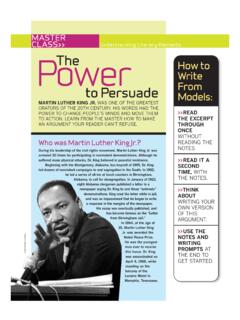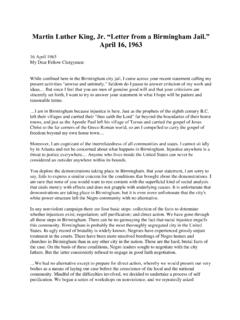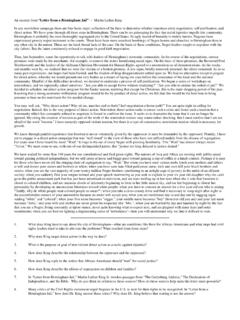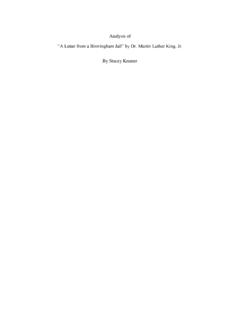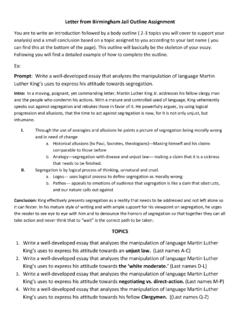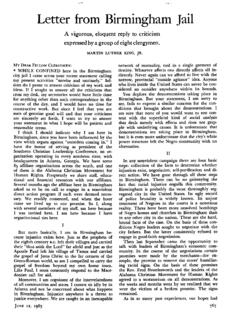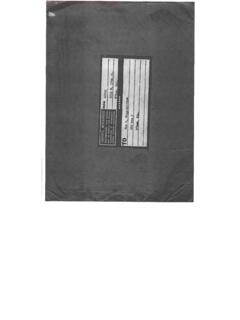Transcription of Ethos, Pathos & Logos in Dr - ProfEssays.com™
1 ethos , Pathos & Logos in Dr. Martin Luther King's " letter from birmingham jail " Logos Logos is an appeal to our logic or reasoning. It is a presentation of the logical relationships between and the reasoning for a particular position. Simply stated, Logos is the setting forth of the reasoning behind a position or action. In our scientific world, many times Logos involves statistics. Dr. King appeals to our logic when he gives the reasoning for his statement "I have almost reached the regrettable conclusion that the Negro's great stumbling block in his stride toward freedom is not the White Citizen's Counciler or the Klu Klux Klanner, but the white moderate, who is more devoted to 'order' than to justice" (719).
2 His reasoning includes the fact that the white moderate does not seem to recognize "that law and order exist for the purpose of establishing justice," that the tension in the South is there due to segregation, that the tension will erupt into violence if it is not the source of a transition to equality, and that to ask Negroes to "passively accept" the indignities of segregation is to deny them their "dignity and worth" as a human being (719-720). Another type of appeal to logic is more implicit. It asks readers to see into the presented facts.
3 In quoting an elderly black woman, "My feets is tired but my soul is at rest" (727), Dr. King makes such an appeal. He mentions that her statement is grammatical incorrect, emphasizing her lack of education and his awareness of such. Why draw attention to this fact? To point out that even the uneducated know and sense the magnitude of the injustice of segregation. In other words, you don't have to be a rocket scientist to see the inequity of the current situation. Also, in quoting this elderly woman, Dr. King's appeal includes an appeal to the emotions.
4 In his supplying the details of this elderly woman with tired feet (the painting of the scene), we feel for her in that she is old and must endure this march to fight for something she justly should already have. Pathos To communicate effectively, Logos is never enough. People respond to emotions and personality as well. Pathos is an appeal to the emotions. When we used vivid details in our personal narratives, we invited readers to experience the action with us, and while experiencing that action feel as we did.
5 Dr. King uses the same strategy in his " letter from birmingham jail ." In the following two quotes, Dr. King's vivid details invite readers to experience the daily lives of African Americans under the laws of segregation. Through the vicarious experience offered in his language, readers experience the details and therefore feel the emotions caused by segregation that have led Dr. King to protest. "But when you have seen vicious mobs lynch your mothers and fathers at will and drown your sisters and brothers at whim" (716).
6 "..when you suddenly find your tongue twisted and your speech stammering as you seek to explain to your sex-year-old daughter why she con't go to the public amusement park that has just been advertised on television, and see tears welling up in her eyes when she is told that Funtown is closed to colored children" (716). Metaphorical use of language invites readers to make associative leaps between certain common experiences and others that are less known. The common experience and its associated emotions are then transferred to the experience that is outside the other's realm of experience.
7 In concluding his letter , Dr. King uses an extended metaphor of a rainstorm to move readers through the emotions of the "dark clouds of racial prejudice," "deep fog of misunderstanding" and "fear-drenched communities" to the hopefulness that he feels is possible through non-violent demonstration in "the radiant stars of love and brotherhood" that in some not too distant future will "shine over our great nation with all their scintillating beauty" (728). Through the association of the ending of a rainstorm with the ending of segregated life, Dr.
8 King hopes non-minorities will begin to glimpse the emotional experience of escaping the horrors and pains of segregation. Other metaphors: "The shadow of deep disappointment settled upon us" (714). "Airtight cage of poverty" (716). Repetitive language can also make an emotional appeal, emphasizing points as if with the background of a beating drum. Dr. King builds both emotional momentum and power through his repetitive words and sentence structure in "Was not Jesus an extremist," "Was not Amos an extremist," "Was not Paul an extremist," etc.
9 (722). COMBINING Pathos WITH Logos In making an appeal to logic, as with the personal essay, giving details first allows a reader to understand more clearly statements of reasoning and feelings. In his response to the patience requested by white ministers, Dr. King first supplies the everyday details of African American life: "vicious mobs lynch[ing] your mothers and fathers" and "drown[ing] your brothers and sisters," "hate-filled policemen curse[ing], kick[ing] and even kill[ing] your black brothers and sisters," six-year-old daughters unable to go to public amusement parks, and African Americans "humiliated day in and day out by nagging signs reading 'white' and 'colored'" (716-717).
10 After these details, the accumulation of their experience and accompanying feelings, when Dr. King states, "then you will understand why we find it difficult to wait" (717), the logic of no longer waiting seems clear and an impossibility. The reader has vicariously felt and experienced the horrors of segregation. People are dying now. There is no time to wait. Now is the necessary time to act. Logos and Pathos are not always separate but many times function together. When Dr. King states, "everything Adolf Hitler did in Germany was 'legal' and everything that Hungarian freedom fighters did in Hungary was 'illegal'" (719), we have a dual appeal.
